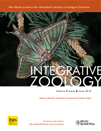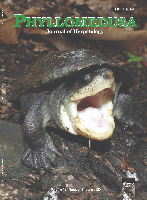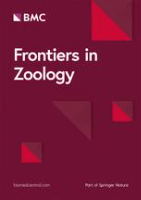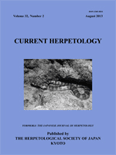
Journal of Vertebrate Biology
Scope & Guideline
Unveiling the complexities of vertebrate life.
Introduction
Aims and Scopes
- Ecological Studies of Vertebrates:
Research that investigates the ecological roles and interactions of vertebrates within their environments, including habitat preferences, foraging behavior, and community dynamics. - Conservation Biology:
Studies aimed at understanding threats to vertebrate species and developing strategies for their conservation, often focusing on endangered species and habitat management. - Evolutionary Biology and Systematics:
Research that explores the evolutionary relationships among vertebrate species, including phylogenetic studies and morphological comparisons. - Behavioral Ecology:
Investigations into the behavioral adaptations of vertebrates, including mating systems, social structures, and responses to environmental changes. - Impact of Invasive Species:
Studies examining the effects of non-native species on native vertebrate populations, including competition, predation, and disease transmission. - Technological Innovations in Research:
Research that utilizes new technologies and methodologies, such as genetic analysis and remote sensing, to study vertebrates and their habitats.
Trending and Emerging
- Climate Change Impacts on Vertebrates:
Research focusing on how climate change affects vertebrate populations, behaviors, and habitats is gaining traction, highlighting the urgency of understanding these dynamics in a rapidly changing world. - Invasive Species Dynamics:
An increasing number of studies are dedicated to understanding the ecological impacts of invasive species on native vertebrates, emphasizing management strategies and ecological resilience. - Genetic and Molecular Approaches:
There is a growing trend towards utilizing genetic analyses to explore questions of biodiversity, conservation genetics, and evolutionary relationships among vertebrate species. - Human-Wildlife Interactions:
Research examining the interactions between humans and wildlife, including conflicts, conservation strategies, and the socio-economic aspects of wildlife management, is becoming more prominent. - Urban Ecology:
Studies that explore how vertebrates adapt to urban environments and the ecological implications of urbanization are on the rise, reflecting the need for urban conservation strategies.
Declining or Waning
- Traditional Morphological Studies:
Research focusing solely on morphological characteristics of vertebrates without integrating ecological or genetic data has decreased, possibly due to a growing emphasis on evolutionary and ecological contexts. - General Biodiversity Assessments:
Broad studies assessing vertebrate diversity in a generic manner have become less frequent, as researchers increasingly target specific ecological interactions and conservation needs. - Local or Regional Focus Studies:
Papers concentrating exclusively on local or regional vertebrate populations without broader implications or comparative analyses are declining, as the focus shifts towards global patterns and conservation strategies.
Similar Journals

ZOOLOGICHESKY ZHURNAL
Advancing the frontiers of zoological knowledge since 1950.Zoologichesky Zhurnal, a prominent journal in the field of Ecology, Evolution, Behavior and Systematics, has been a vital publication since its inception in 1950. Published by MAIK Nauka-Interperiodica in the Russian Federation, this journal has established a notable reputation in disseminating scientific research and advancing knowledge in zoology. With its coverage spanning from 1950 to 2023, and a specific convergent focus during 1982-1983, this journal contributes significantly to the ecological and evolutionary sciences, even though it currently holds a Q4 classification in the 2023 category quartiles, indicating its niche positioning among peers. Researchers and students engaged in the study of biological sciences, particularly those interested in the dynamics of ecosystems, behavior of species, and evolutionary processes, will find valuable insights and original research articles within its pages. While access to this esteemed journal is not open, it remains an essential resource for those seeking to deepen their understanding of zoological sciences.

ANIMAL BIOLOGY
Exploring the Intricacies of Animal LifeANIMAL BIOLOGY is a distinguished journal published by BRILL, focusing on the dynamic fields of Animal Science and Zoology, as well as Ecology, Evolution, Behavior, and Systematics. With an ISSN of 1570-7555 and an E-ISSN of 1570-7563, this quarterly journal serves as a pivotal platform for researchers and professionals seeking to contribute to the understanding of animal biology across diverse ecological contexts. The journal is recognized with a 2023 Scopus ranking of #234 out of 490 in the Animal Science and Zoology category, placing it within the 52nd percentile, alongside a rank of #409 out of 721 in Ecology, marking a solid contribution to the field. Although it currently holds a Q3 quartile in both categories, its commitment to quality research and novel insights continues to bolster its significance within the academic community. The open access option coupled with its publication history from 2003 to 2024 ensures a wide dissemination of knowledge, drawing in a global audience of researchers, professionals, and students eager to explore the intricacies of animal biology. By promoting high-quality discussions and innovative studies, ANIMAL BIOLOGY plays an essential role in advancing the understanding of life sciences and the evolution of biodiversity.

PAKISTAN JOURNAL OF ZOOLOGY
Advancing zoological knowledge for a sustainable future.Pakistan Journal of Zoology, established in 1975 and published by the Zoological Society of Pakistan, is a pivotal resource in the field of zoology and animal science, contributing to the academic discourse and research advancements in the region. With an ISSN of 0030-9923, this journal strives to disseminate innovative research findings and scholarly articles that explore various facets of animal biology, ecology, and conservation. Although classified in the Q4 quartile within the animal science category, its commitment to providing a platform for emerging researchers makes it crucial for those in the zoological community. The journal covers a broad range of topics relevant to contemporary issues in zoology, promoting both local and international collaborations. Situated in Lahore, Pakistan, its contributions are vital for promoting biodiversity awareness and conservation efforts within the region. Accessible research outputs empower students and professionals alike to engage in critical discussions and applications within the disciplines of zoology and animal science.

Integrative Zoology
Elevating the Study of Animal DiversityIntegrative Zoology is a distinguished journal published by WILEY, focusing on advancing the field of zoological sciences through the integration of various biological disciplines. With both ISSN 1749-4877 and E-ISSN 1749-4869 identifiers, this journal features research that fosters a deeper understanding of animal biology, ecology, and conservation strategies. As a testament to its impact, Integrative Zoology is recognized within the Q1 category of Animal Science and Zoology in 2023, ranking an impressive #27 out of 490 journals in its field, placing it in the 94th percentile among peers. Published in the United Kingdom, this journal not only serves as a critical platform for novel research but also engages a global audience, inviting submissions that bridge theoretical and practical aspects of zoology. While not entirely open access, the journal remains committed to disseminating high-quality research that contributes substantially to scientific advancements. Through its continuous publication since 2008, Integrative Zoology aims to inspire researchers, educators, and students alike, making it a cornerstone for anyone passionate about the complexities of animal life.

PHYLLOMEDUSA
Fostering scientific dialogue in the realm of zoology.PHYLLOMEDUSA is a distinguished, peer-reviewed journal dedicated to the fields of Animal Science and Zoology and published by UNIV SAO PAULO, ESALQ in Brazil. With an Open Access model in place since 2002, PHYLLOMEDUSA provides a vital platform for the dissemination of research findings, ensuring that quality scholarly articles are freely accessible to a global audience. The journal currently holds a Q3 classification in its category and ranks #375 out of 490 in Scopus, reflecting its commitment to fostering scientific dialogue and advancing knowledge within the community. Covering a diverse range of topics related to amphibian biology, ecology, and conservation, the journal invites contributions from researchers and professionals alike, empowering them to share innovative insights and collaborative studies that address contemporary challenges in zoological sciences. With a converged publishing timeline extending from 2005 to 2024, PHYLLOMEDUSA remains a pivotal resource for academics, students, and practitioners eager to stay abreast of the latest developments in the field.

REVUE SUISSE DE ZOOLOGIE
Your Gateway to Cutting-Edge Zoological ResearchThe REVUE SUISSE DE ZOOLOGIE, published by the esteemed MUSEUM HISTOIRE NATURELLE, is a premier journal dedicated to advancing the field of zoology and its related disciplines. Established in 1964, this Swiss journal has consistently provided a platform for high-quality research in the areas of ecology, evolution, behavior, and systematics, currently holding a commendable Q3 ranking in these categories for 2023. With a rich publication history spanning from 1964 to 1979 and then from 1994 to the present, it serves not only as a significant repository of knowledge but also as a crucial resource for researchers, professionals, and students alike. While the journal is not open access, it remains a vital tool for those wishing to stay at the forefront of zoological research and innovation. Its commitment to disseminating groundbreaking studies makes it an indispensable asset for academic institutions and researchers globally, ensuring that pivotal findings in zoology continue to gain visibility and impact.

SPIXIANA
Cultivating a Deeper Understanding of Zoological SciencesSPIXIANA is a distinguished journal dedicated to the fields of animal science and zoology, published by VERLAG DR FRIEDRICH PFEIL in Germany. With the ISSN 0341-8391, it has been contributing to the scientific community since its inception, with volumes converging from 2008 to 2024. Although currently listed in the Q4 quartile of the 2023 category rankings for Animal Science and Zoology, it provides a vital platform for researchers and professionals to disseminate significant findings in the field. Despite being unindexed in open access, SPIXIANA ensures that vital research reaches its audience, enhancing academic discourse and furthering our understanding of zoological sciences. Its commitment to sharing rigorous scientific research make it an important resource for anyone passionate about animal biology and conservation.

BELGIAN JOURNAL OF ZOOLOGY
Innovating Research in Animal Biology and Ecology.The BELGIAN JOURNAL OF ZOOLOGY, published by the Royal Belgian Zoological Society, serves as a prominent platform for advancing research in the field of zoology. With an impact factor reflecting its status within the academic community, this journal rigorously publishes innovative studies and reviews, covering a broad spectrum of topics related to animal science and zoology. As an esteemed outlet, the journal ranks in the Q2 category for both Animal Science and Zoology, demonstrating its relevance and contribution to the field, as indicated by its Scopus ranking of 255 out of 490. Although it operates under a subscription model, the journal is committed to disseminating high-quality research that can shape contemporary understanding of animal biology and ecology. With a publication history dating back to 1990 and extending through 2024, researchers, professionals, and students are encouraged to engage with its rich content, which is vital for ongoing discourse and discovery within zoological sciences.

Frontiers in Zoology
Pioneering discoveries in animal behavior and systematics.Frontiers in Zoology is a premier, open-access journal published by BMC that has been a cornerstone of zoological research since its inception in 2004. With a commitment to advancing the field, this journal covers a broad spectrum of topics within Animal Science and Zoology, as well as Ecology, Evolution, Behavior, and Systematics. Recognized for its quality, it holds a distinguished Q1 ranking in both of these categories and ranks within the top percentiles in Scopus, with 87th and 78th percentiles, respectively. Based in the United Kingdom, it provides researchers, professionals, and students with innovative studies and findings that encourage interdisciplinary collaboration and exploration. The journal is dedicated to facilitating the open exchange of scientific knowledge, making it an essential resource for those seeking to stay at the forefront of zoological and ecological sciences.

CURRENT HERPETOLOGY
Pioneering research in herpetology since 2000.CURRENT HERPETOLOGY is a leading journal dedicated to the study of reptiles and amphibians, published by the Herpetological Society of Japan in collaboration with the Graduate School of Science at Kyoto University. With its ISSN 1345-5834 and E-ISSN 1881-1019, this journal serves as a vital platform for sharing significant research findings in the field of herpetology. The journal has been continuously contributing to the scientific community since its inception in 2000, with a scope that embraces diverse topics including ecology, behavior, conservation, and physiology of herpetofauna. Recognized for its scholarly impact, CURRENT HERPETOLOGY holds a commendable position within the Q3 quartile in the Animal Science and Zoology category, ranking 350 out of 490 according to Scopus metrics. Although it is not currently an open-access journal, it caters to an audience comprising researchers, professionals, and students looking to deepen their understanding and engage with cutting-edge studies. Based in Japan, at the Department of Zoology in Kyoto, this journal is poised to foster advancements in herpetological research and promote global collaboration in this vital area of science.